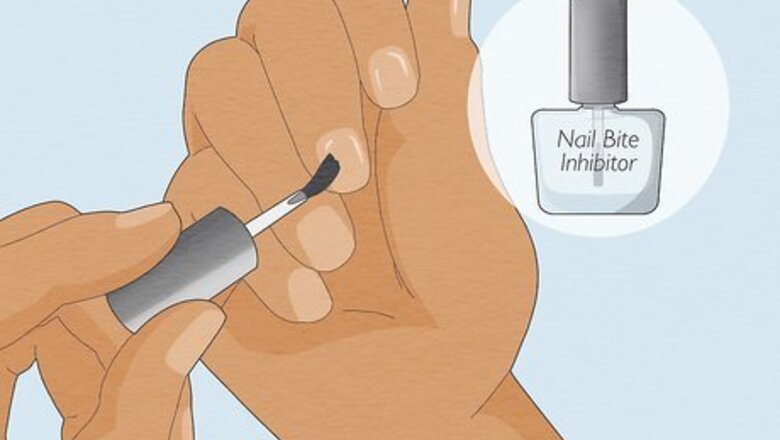
views
Use a bitter-tasting nail polish.
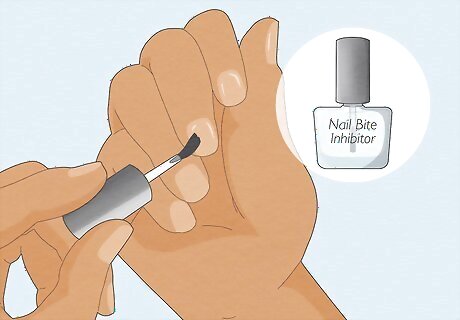
This works for nail biters and finger biters alike. Get a bitter tasting nail polish, also called a "nibble inhibitor." Paint your nails with the product. Use a generous amount and allow it to cover the skin around your nails as well. When you put your fingers in your mouth, the bad taste will repel you. You could also try a different bitter substance, like vinegar or lemon juice. Or rub your fingertips with a mixture of coconut oil and cayenne pepper. Just be very careful not to touch your eyes. Getting your nails done might also lower your urge to bite.
Keep your fingers and mouth busy.
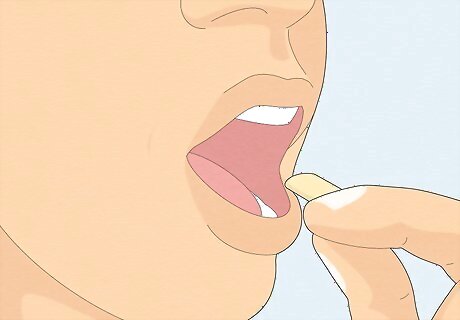
If your fingers and mouth are otherwise occupied, you won't be able to pursue your habit. Keeping your fingers and mouth busy is also called the "competing response technique." After using it for a few weeks, your impulse to bite your fingers should go away. To keep your mouth busy, chew gum, eat breath mints or hard candy, or carry a water bottle that you sip every few minutes. To keep your fingers occupied, try doodling, knitting, folding your fingers together or sitting on your hands.
Cut your nails regularly.
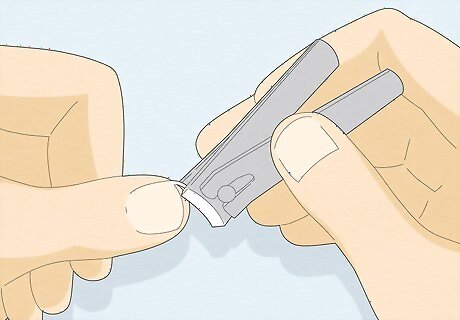
Keeping your nails short can make it less tempting to bite your fingers. Cut your nails straight across, leaving about 1-2 mm of white. Straight cuts are important to help you prevent ingrown nails. Use an emery board or nail file to smooth out the edges so you're not tempted to pick at them. Disinfect your nail clippers monthly in a bowl of 70-90% isopropyl alcohol.
Take it one finger at a time.
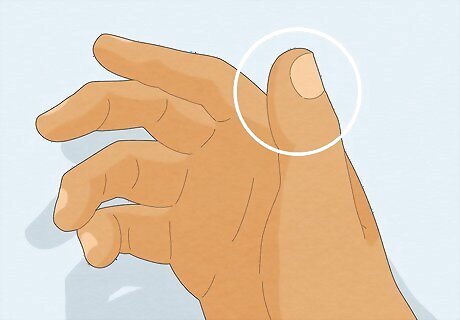
Some biters find it helpful to keep one finger "safe" at a time. Choose the finger you're most likely to bite. Consciously focus on not biting that finger. You're allowed to bite the others, but that one is safe. After a week or two, you'll see what a difference it makes to leave one finger alone. Your safe finger will not be swollen, bloody or otherwise damaged. It will look healthy in comparison to the rest. Seeing this difference can be motivation to stop biting all of your fingers. One by one, keep more of your fingers "safe" until you're no longer biting any of them.
Cover your nails with bandages or gloves.
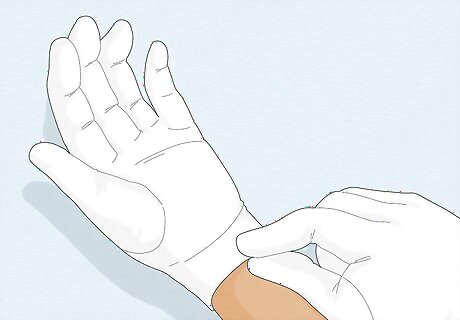
These can help if you have trouble catching yourself before you bite. Wrap an adhesive bandage around each fingertip to completely cover it. Wear the bandages or gloves throughout the day so that each time you bite, you get a mouthful of material. The unpleasantness of biting into a bandage, as well as the feeling of self-consciousness and embarrassed you may feel about wearing bandages in public, can help you get rid of your habit. For a more discreet option, try using clear tape. You could also cover just the fingertips you tend to bite most often. You could also wear gloves to cover your fingers.
Learn to anticipate when you're going to bite.
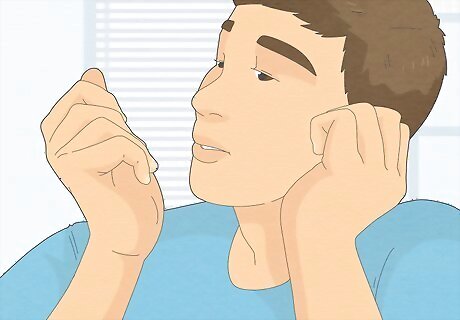
Figure out what feelings lead to the impulse. By being more aware of what you're doing, you might be able to catch yourself before you bite. Next time you raise your finger to your mouth, stop and think. Ask yourself what you're feeling in the moment you raise your finger to your mouth. In most cases you'll feel anxious or bored. Other signs of anxiety include shallow breathing, a faster heartbeat, and sweating. Next time you have that same bored, nervous, or anxious feeling, you'll consciously realize what's going on. You can put down your finger before you bite. Try to figure out why you bite your nails, too. Are you doing it because it feels good, because it's distracting you, or because of some other reason? You may have developed a nail-biting habit to help cope with something anxiety- or stress-inducing. Don't stop the habit altogether, especially if you've used it as a coping skill. Instead, see if you can replace it with something.
Try progressive muscle relaxation.
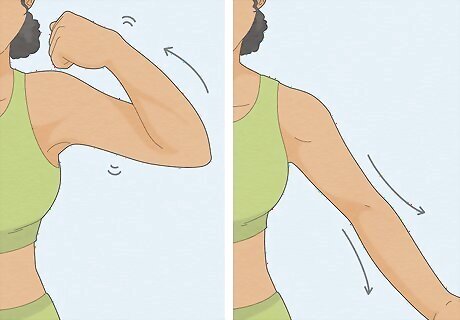
This technique can help relieve stress and distract you from finger biting. When you feel yourself getting anxious in a given situation, try this to resettle yourself. It also works if you're feeling bored. Start by tensing the muscles in your arms as hard as you can. Breathe in as you do this. Hold your muscles tight for five seconds. Exhale and relax your muscles. Stay relaxed for 15 seconds. Tense another muscle and inhale for five seconds. You could tense your back muscles, abdomen, thighs, calves, and so on. Exhale and relax for 15 seconds. Continue until you have tensed and relaxed all of your main muscle groups. The urge to bite should have subsided. If it hasn't, repeat the process. You may need to rotate between muscle groups for ten or more minutes.
Do a deep breathing technique.
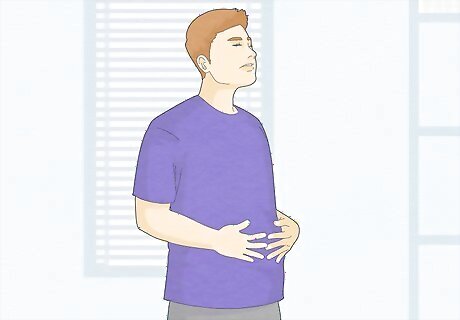
Studies show that this can be used to help put an end to many types of bad habits. When you feel the urge to bite your fingers, use this technique: Sit or stand up straight with your shoulders back and your head upright. Take a slow, controlled breath that fills out your abdomen. Your stomach should move out when you inhale. If only your chest moves, your breathing is too shallow, and you need to focus on inhaling more deeply. Exhale and let your belly recede. Continue deep breathing in this way for at least five minutes, or until the urge to bite your fingers passes.
Practice mindfulness.
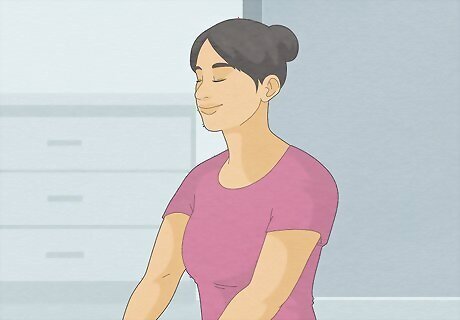
You’re less likely to bite your nails if you’re mindful about the present. After all, mindfulness is just another word for being fully in the present moment. Practice mindfulness as often as possible, since it gets easier with time. When you feel your thoughts wander in an anxious direction, focus on your physical senses. Think about what you see, taste, hear, feel and smell right now. Keep focusing on the present moment until the urge to bite passes. If you're having trouble getting your mind into the present, try looking down at your fingers and flexing them.
Try alternative medicine treatments.
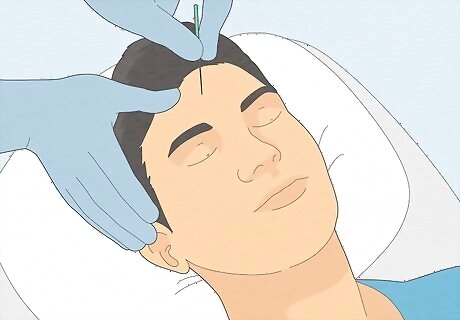
Alternative medicine may help if your habit seems anxiety-related. Speak with an alternative health practitioner about which treatments might be best for your situation. Here are a few popular choices: Acupuncture. This is the ancient Chinese practice of inserting needles into certain areas of the body. Some studies have shown that acupuncture can be a helpful treatment for anxiety. Hypnosis. This involves working with a practitioner to tap into your unconscious mind and take steps to relieve anxiety. Meditation and yoga. Studies show that these practices are helpful in getting in better touch with your body and treating the physical and mental symptoms of anxiety.
Make lifestyle changes.
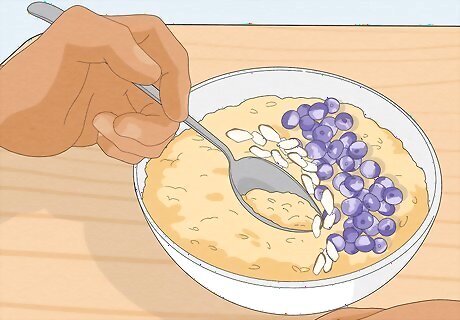
Certain lifestyle habits can make anxiety worse. This can eventually lead to the state of mind that leads you to bite your fingers. Addressing anxiety by making simple changes can go a long way toward helping you kick a bad habit. Try doing the following: Eat a nutritious diet. Studies show that whole grains, almonds, maca root and blueberries can help with anxiety. Avoid foods high in refined sugar. Cut back on alcohol and caffeine. Both of these substances have properties that can make anxiety worse. Regular exercise releases endorphins that reduce anxiety. Getting plenty of sleep is another important way to reduce your anxiety and sense of well being.
Get a diagnosis for dermatophagia.
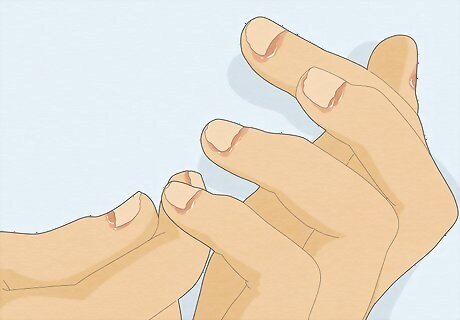
Dermatophagia is a psychological condition similar to obsessive-compulsive disorder. If you feel that your finger biting is uncontrollable no matter what, you may have this treatable condition. The symptoms of dermatophagia are as follows: Bleeding skin. When you have dermatophagia, you bite the skin around your nails so much that it causes bleeding. Skin discoloration is common. Hangnails and other nail damage may occur. The fingertips may be calloused from excessive biting.
Seek the help of a therapist.
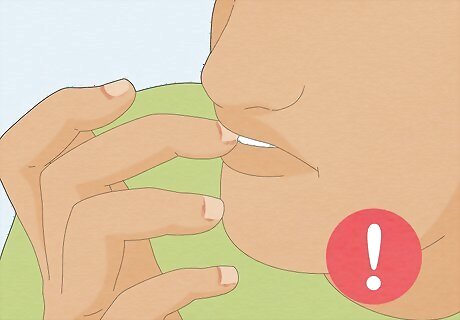
It's important to get outside help to deal with dermatophagia. Like obsessive compulsive disorder, it's very difficult to cure this on your own. Make an appointment with a therapist who knows what the disorder is and has experience treating your condition. A therapist will be able to help you figure out if your condition is caused by anxiety, and treat the underlying problem. Cognitive-behavioral therapy is a form of therapy that focuses on the relationship between thoughts and behavior. This has been found to be very helpful in treating anxiety disorders. Seek out a support group, either in person or online, for extra help in dealing with the disorder.
Consider medication.
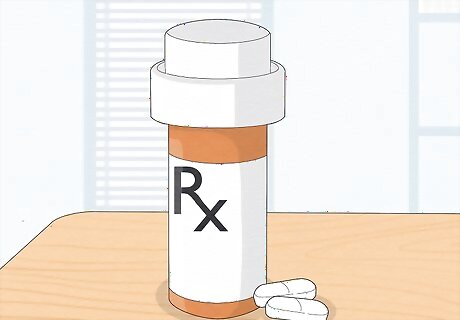
Some anxiety disorders respond well to medications along with therapy. Make an appointment with a psychiatrist to explore whether medication could be the right choice for you. Depending on your needs, a psychiatrist may prescribe one of the following types of medications: Antidepressants such as serotonin reuptake inhibitor (SSRI) and serotonin norepinephrine reuptake inhibitor (SNRI) Buspirone Benzodiazepines














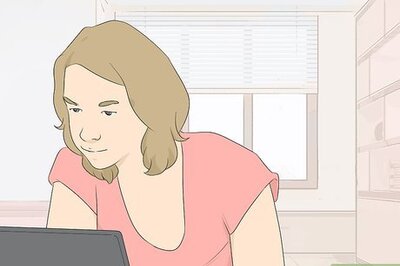



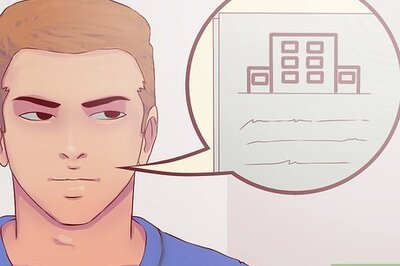

Comments
0 comment